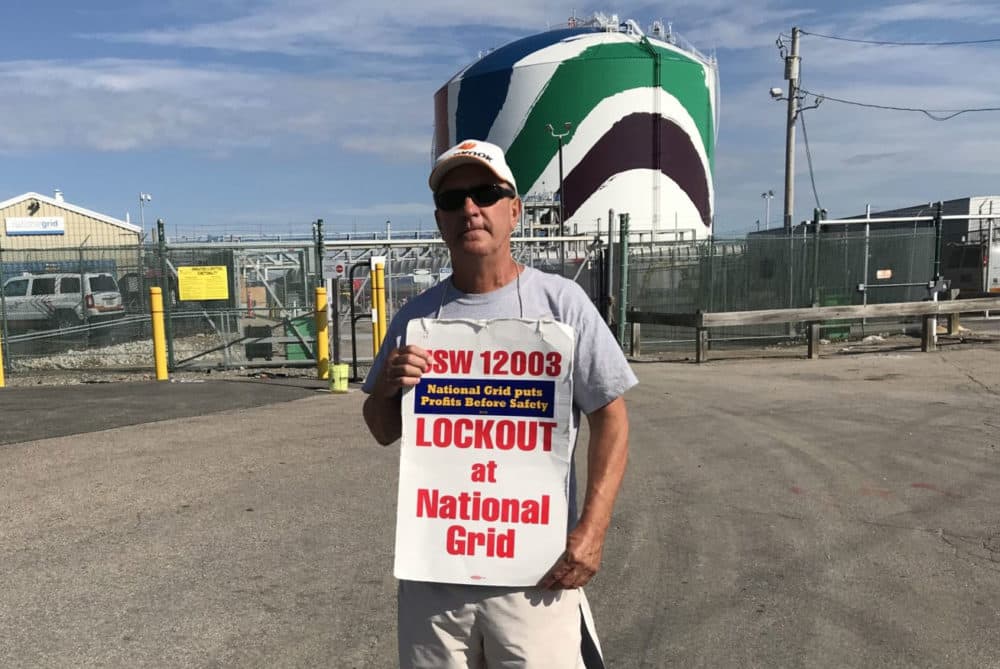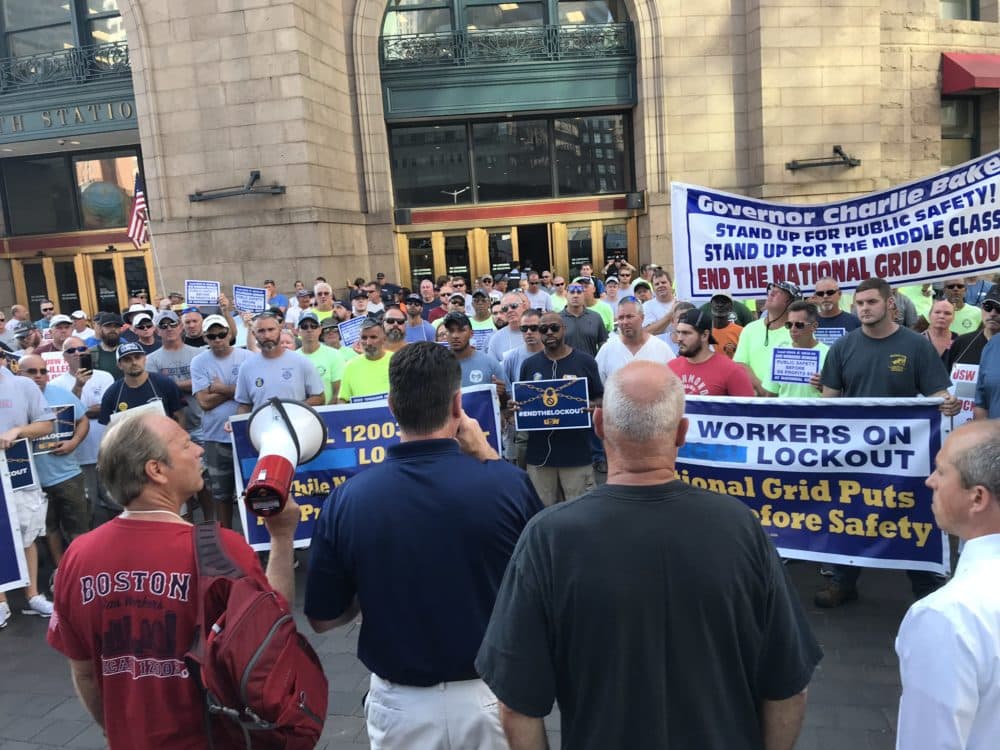Advertisement
As Negotiations Drag On, National Grid Workers Struggle To Make Ends Meet
Resume
Not every worker who had Labor Day off Monday wanted it — 1,250 National Grid gas workers would have preferred being on the job.
Three months ago, the utility locked the doors on the union workers after contract negotiations stalled. The workers have been without paychecks and health insurance ever since.
'You Wouldn't Believe The Stress'
Standing in front of his workplace, Paul Baszkiewicz says it's a Boston landmark. But the iconic multicolored tank off I-93 isn't just for show — it holds a third of a million barrels of liquid natural gas. Owned by National Grid, it's backup energy for power plants.
Baszkiewicz is a 29-year veteran of the utility. For the past eight years, he has been crew chief overseeing operation of the frozen fuel farm. Because of the responsibility and training, he's one of the most highly paid union workers. During bitter cold spells, he can work 12-hour shifts, seven days a week.

But he and his fellow union gas workers haven't worked in 11 weeks.
"You wouldn't believe the amount of stress," Baszkiewicz says. "It affects everything else. It's not an easy thing when they cut your insurance and you go to the doctor's. My wife had cancer for years and we had to scramble to get her insurance, and I can't afford to pay the insurance myself."
Locked-out gas workers are digging deep into life savings. And the two locals of the United Steelworkers have been tapping their strike and defense funds to help members in need, many of whom live paycheck to paycheck.
The National Grid workers have been receiving unemployment compensation since the lockout began. During a Boston Gas Company lockout in 1993, the state Legislature passed a law enabling workers whose wage and benefits were cut off to immediately begin collecting unemployment.
Julie Bentivegna, an emergency response unit worker for National Grid out of Malden, has worked for the company for 17 years and is now receiving $729 per week in unemployment. She says she helps save lives at her daily job, but can't afford to pay her bills.
"I have a mortgage that's $2,300; I have taxes, insurance and a water bill — that's about $1,200; besides my car payment, that's $400," Bentivegna says. "I'm actually diabetic, and so now the medications kick in, and it's $600 a month. I don't have insurance, so that's exactly what I'm paying — $600 a month."
Bentivegna says she is not eligible for MassHealth because she receives too much money in unemployment to qualify.
David Monahan has worked as a residential service technician for National Grid for nine years. The union is paying his $2,500 a month health insurance premium.
"Two weeks prior to this, I was diagnosed with a cancerous tumor in my bladder," Monahan said. "So, I had health insurance when we were locked out — and then I didn't have health insurance when we were locked out — so it changes everything."
Monahan is the sole provider for his wife and 16-month-old daughter. They have another child on the way.
"My family doesn't work for National Grid, I work for National Grid. You know, they did this to my family as a byproduct for what they did to me," Monahan says. "I try not to bring the stress home because the last thing my wife needs, being pregnant, is added stress."

Monahan says the worst part is not knowing when he can go back to work.
"This is an open-ended thing," he says. "This could be a year. Who knows how long this could go on?"
The last time there was a lockout of gas workers in Boston was 1996. Monahan's father was a union member, out of work for six months. The son recalls it was a painful time and he takes National Grid's lockout personally.
"We're the ones that answer the phone call in the middle of the night when they call because they need us to come in to do something," he says. "And we've always been there, so it's taking a good workforce and wrecking it — wrecking a lot of relationships for a lot of people."
National Grid declined to comment for this story, but previously, company President Marcy Reed acknowledged the toll the lockout is having on human relations.
"People have feelings. It will be tough to get past it, and I'd be naive if I thought all of those feelings were going to go away overnight, but working at National Grid is kind of like a family and it is in that spirit that we're going to bring them back," Reed told WBUR last month.
The stalemate is over health care costs, retirement benefits for new workers and the number of union inspectors on sites.
Union officials say National Grid is trying to wait out workers whose unemployment compensation ends in the dead of winter — when the company will need its union workers the most, to keep it customers warm.
Union and utility negotiators were set to meet Tuesday afternoon.
This article was originally published on September 04, 2018.
This segment aired on September 4, 2018.
